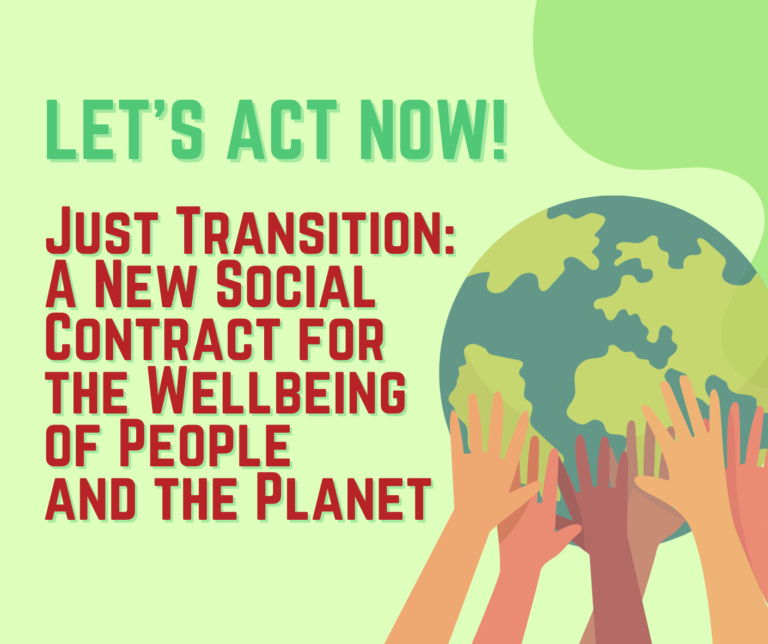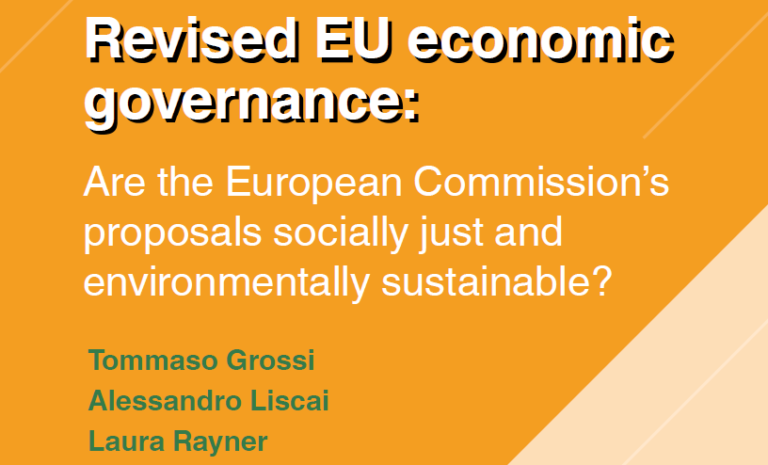Event report – A Just Energy Transition: Access to Energy as a Right, not a Privilege
November 25 2022
On 21 November, together with Social Platform, Foundation for European Progressive Studies (FEPS) and Friedrich-Ebert-Stiftung (FES), SOLIDAR held a policy discussion on the issues of energy poverty and a just energy transition in Europe.
Energy prices are soaring. Poverty is increasing. Already before the energy price crisis, millions of Europeans lived in energy poverty, now millions more are struggling to pay bills and live a decent life. The Russian Federation’s cruel invasion of Ukraine has impacted the geopolitics of decarbonising and has put the EU’s ambitions to tackle the structural causes of energy poverty and accelerate the transition to renewable energy under threat. Today’s cost-of-living crisis is deepening socioeconomic inequalities, but this cannot be used as an excuse to lower the EU’s ambitions to fight climate change and environmental degradation. On the contrary, these crises powerfully illustrate how social justice and climate action are mutually reinforcing. They point out that it is paramount for socioeconomic fairness to be placed at the centre of the ecological transformation.
The policy discussion aimed at addressing how the EU can rapidly respond to the energy price crisis without sacrificing a just energy transition. László Andor, Secretary General of FEPS, opened the event by highlighting that never in the life of this generation have issues such as climate, environment, energy, security and social cohesion been so entangled. Over the past few years, FEPS has increasingly analysed the critical implications of the climate transition on inequalities, various types of social imbalances, intergenerational equity and other issues. And while Russia’s invasion of Ukraine seemed to offer an opportunity to double-down on climate objectives and some progressive goals, we are witnessing a shift to fracking, the return to coal in some countries, as well as further deforestation. We find ourselves in a very complicated situation, in which it is no easy effort to facilitate climate justice and the energy transition with fairness, maintain social cohesion and protect people from poverty, at a time when war and the economic warfare is driving up the prices of energy and food.
Professor Enrico Giovannini, former Italian Minister of Infrastructure and Sustainable Mobility and former Minister for Employment and Social Policies, as well as former President of the Italian National Institute of Statistics, delivered a keynote address on sustainable and affordable living. Prof. Giovannini highlighted that “Just Transition” is not just a buzzword, and that improving environmental sustainability, economic competitiveness and social equity simultaneously should be at the heart of government policy. This was the case of Italy until recently, as the previous government introduced the concept of intergenerational justice among the fundamental principles in the Italian constitution. Moreover, the previous Italian Ministry of Infrastructure and Sustainable Mobility placed equality at the heart of infrastructure design and transport system design. Starting with the development of a fully-fledged system for ex-ante evaluations of new investments in infrastructures and mobility systems according to the SDGs and the Do No Significant Harm principle. To include the element of “fairness” in mobility policies, the Ministry used the concept of accessibility and estimated that, by investing the 61 billion € obtained through the National Recovery and Resilience Plan, a person’s time to access the main mobility connections could be cut down by 38%. In cities, they promoted a shift in approach, from local transport systems to sustainable local mobility, which allowed for better integration of the various means of transport available. In conclusion, Prof. Giovannini recognised that EU initatives such as NextGenEU, REPowerEU and the Social Climate Fund are fundamental instruments to ensure that issues of equity and fairness are not addressed secondarily.
Prof. Giovannini’s keynote was followed by a panel discussion on finding solutions for a just energy transition and to eradicate energy poverty. The session was moderated by David Rinaldi, Director of Studies & Policy at FEPS.
Via video recording, Niels Fuglsang, Member of the European Parliament and of the S&D Group and lead negotiator on the Energy Efficiency Directive, stated that the energy crisis is the result of decades of failed energy policies and that we should have had a stronger and earlier green transition. The Progressives want to get out of this crisis by accelerating dramatically the green transition, meaning by ramping up renewables and increasing energy efficiency. Lastly, he said that, for the green transition to be just, those who cannot afford to buy energy must be prioritised for the insulation of homes.
Veronique Marx, Team Leader for Just Transition at DG ENER, says that the European Commission (EC) does not see ensuring energy security and eradicating energy poverty as opposing objectives. Already in 2019, the EC defined energy as a fundamental service for the wellbeing of citizens. Several legislative proposals under the Fit for 55 aim to strengthen how energy poverty is addressed: the Energy Performance of Buildings Directive, the Social Climate Fund, and the Energy Efficiency Directive, which includes an EU definition of energy poverty. In addition, through the 26 already approved Recovery and Resilience Plans, up to 65 billion € have been allocated to energy efficiency and renovations to tackle energy poverty. With regard to energy security, the focus of the EC is on diversity of supply, more investments in renewable energy and energy efficiency to reduce consumption. Last year, the EC adopted a toolbox that indicates to Member States what measures they can implement to protect vulnerable consumers from the high prices (energy vouchers, a ban on disconnection, regulated prices, etc.). But the Commission has also put forward proposals that aim to reduce the consumption of gas and electricity, for a solidarity contribution from the oil, gas and coal sectors, as well as to extend regulated prices to SMEs and allow Member States to implement below-cost regulated prices. Lastly, the EC plans to publish a proposal to change the electricity market early next year.
Guillaume Lepere, Deputy Head of Cabinet of Minister-President of Wallonia Elio Di Rupo and speaking on his own behalf, says that, to tackle energy poverty and the climate crisis jointly, we need to act on three levels, starting with energy prices. For instance, the Walloon government extended the social tariff and made it accessible to 1 million households. Secondly, we need to act on the energy consumption by promoting insulation, for instance through no interest loans, specific subsidies for low-income households, as well as by providing support to those who wish to insulate their homes but do not know how. We should also look at new ways of doing insulation, such as refurbishments by districts, which could help save money and convince more people to join the effort. Thirdly, we must give access to renewable energy sources to more people, including by investing in energy communities and energy sources cooperatives.
Alva Finn, Secretary General of Social Platform, points out that, in addition to short-term targeted measures such as income support, we must deal with energy security from a more long-term perspective. This includes, among other things, strengthening the resilience of the welfare state and of social services, tackling the high inflation and rising prices in all areas of life, ensuring tax justice and redistribution of wealth into the welfare system, and fostering social and civil dialogue in order to create a more widespread perception of fairness in the efforts made.
Camille Defard, Research Fellow EU Energy Policy at the Jacques Delors Institute, mentions that energy poverty is generally caused by three main factors: the poor energy performance of buildings, high energy prices and low household income. According to Camille, the European Green Deal is the way forward and the Social Climate Fund is an essential instrument to achieve the climate target and address the social emergency. It is an historical opportunity to tackle the financing gap in the mobility and building transition for the most vulnerable households. Deep renovation of buildings can cut the energy bill up to 90% and it costs a household about the same price of a new car. For the Jacques Delors institute the budget for the Social Climate Fund needs to be multiplied by 5 (to make 35 million Europeans access deep renovation, we would need to invest 50 billion € per year between now and 2030) and financed with means other than just ETS2. Moreover, there should be technical assistance and a strong regulatory framework that supports deep renovation in the buildings sector. Lastly, Camille concluded that we also need to think beyond the European Green Deal and focus on the distributional issues raised by the energy price crisis and windfall profits.
Laia Segura, Co-Coordinator of the Right to Energy Coalition, says that the energy system today is failing to provide the energy we need for survival and wellbeing, and it is resulting in widespread inequality and suffering across households, while fossil fuel corporations are reporting the highest profits in at least half a decade. Already in 2019, 1 in 4 households struggled to pay the energy bills, and energy poverty was linked to a public health burden of almost 200 million € and 100.000 premature deaths per year. Today, millions more struggle to access energy. Tackling energy security and energy poverty together calls for a holistic approach and intervention, and for addressing the structural causes of these crises: profit-driven energy system, inefficient buildings, and reliance on fossil fuels. And this frenzy patchwork of emergency measures needs to be short-term, as to avoid the risk of perpetuating our reliance on fossil fuel industry. Lastly, Laia mentioned that we should develop more permanent responsibility for fossil fuel corporations and avoid that states become over-reliant on the over profits that these companies are making.





